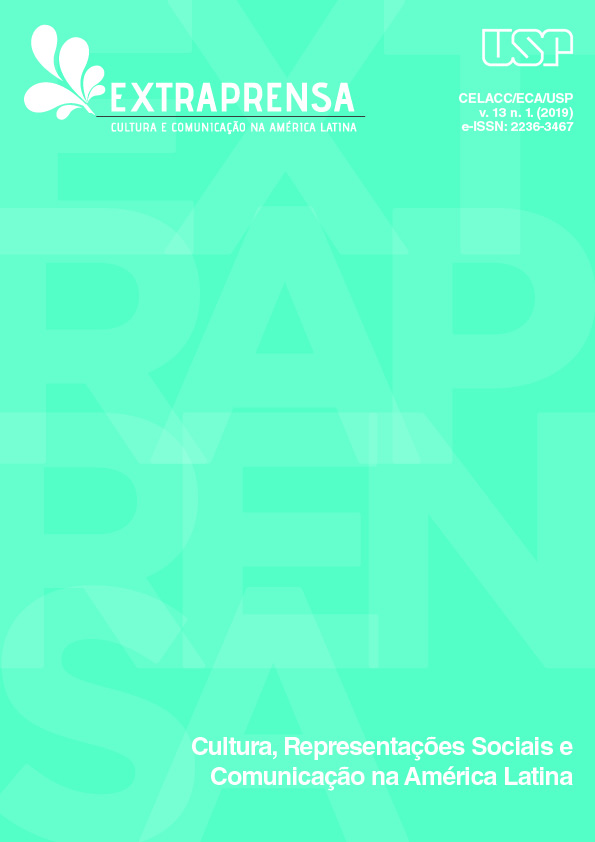Identidad y Relaciones Interculturales en Guaraní: el viaje como estrategia narrativa
DOI:
https://doi.org/10.11606/extraprensa2019.163276Palabras clave:
Cine Latinoamericano, Identidad Sociocultural, Interculturalismo, Transnacionalismo, TransculturalismoResumen
El artículo intenta contextualizar los conceptos de interculturalismo, transculturalismo y transnacionalismo en su representación en el cine por medio del análisis de la película Guaraní, que cuenta la historia de Atílio, un viejo pescador paraguayo de una comunidad guaraní, que vive en las riberas del río Paraná con sus hijas y la nieta Iara, la cual él la trata como si fuese un niño. Con la noticia de que su hija Helena, madre de Iara que había marchado de su ciudad a buscar fortuna en la Argentina, está embarazada de un varón, decide ir a Buenos Aires para convencerla a tener a su bebé en la tierra donde nació. En su largo trayecto, que se inicia en su propio barco y termina haciendo dedo en las autopistas, le acompaña su nieta Iara. La película adopta un abordaje semidocumental para narrar los conflictos entre la preservación de las tradiciones indígenas bajo un contexto de economía globalizada que cada vez más oprime viejas formas de producción, a partir de la perspectiva de Atílio que ya no logra encontrar su sitio en esta nueva realidad, y de la joven protagonista, que logra transitar entre dos mundos, pero teme asumir la vida adulta dejando atrás sus orígenes.
Descargas
Referencias
ARRIGUCCI JÚNIOR, Davi. Enigma e comentário: Ensaios sobre literatura e experiência. São Paulo: Companhia das Letras, 1987.
BLASINI, Gilberto. Recorriendo las Americas: cars, roads, and Latin American Cinema.. In: GARIBOTTO, Verónica; PÉREZ, Jorge (ed.). The Latin American road movie. Basingstoke: Palgrave Macmillan, 2016.CANCLINI, Nestor García. Culturas híbridas: estrategias para entrar y salir de la modernidad. Buenos Aires: Paidós, 2001.
BRANDÃO, Carlos Rodrigues. Os Guarani: índios do Sul – religião, resistência e adaptação. Estudos Avançados, São Paulo, v. 4, n. 10, p. 53-90, 1990.
CANCLINI, Nestor García. Diferentes, desiguales y desconectados: mapas de la interculturalidad. Barcelona: Gedisa, 2004.
IANNI, Octavio. Globalização e transculturação. Revista de Ciências Humanas UFSC, Florianópolis, v. 14, n. 20, p. 139-170, 1996.
PAIS, José Machado. A juventude como fase de vida: dos ritos de passagem aos ritos de impasse. Saúde e Sociedade, São Paulo, v. 18, n. 3, p. 371-381, 2009. Disponível em: http://bit.ly/38KE5Vs. Acesso em: 20 dez. 2019.
PAIVA, Samuel. Gêneses do gênero road movie. Significação: Revista de Cultura Audiovisual, São Paulo, n 36, p. 35-53, 2011.
SCHEMES, Elisa Freitas. A literatura de viagem como gênero literário e como fonte de pesquisa. In: SIMPÓSIO NACIONAL DE HISTÓRIA, 28., 2015, Florianópolis. Anais […]. Florianópolis: Universidade Federal de santa Catarina, 2015. Disponível em: http://bit.ly/313g4X4. Acesso em: 21 jun. 2018.
SILVA, Denise Mota da. Vizinhos distantes: circulação cinematográfica no Mercosul. São Paulo: Annablume, 2007.
Descargas
Publicado
Número
Sección
Licencia
Aviso de derechos de autor/a
Al someter cualquier producción científica para la publicación en Extraprensa, el autor, de ahora en adelante, acepta licenciar su trabajo dentro de las atribuciones de Creative Commons, en la cual su trabajo podrá ser accedido y citado por otro autor en eventual trabajo, sin embargo, obliga la manutención de todos los autores que componen la obra integral, incluso aquellos que sirvieron de base para el primero.
Toda obra aquí publicada se encuentra titulada bajo las siguientes categorías de licencia Creative Commons (by/nc/nd):
Competencia (de todos los autores que componen la obra);
Uso no comercial en cualquiera de las hipótesis;
Prohibición de obras derivadas (el trabajo puede ser mencionado, sin embargo, no podrá ser reescrito por terceros);
Distribución, exhibición y copia ilimitada por cualquier medio, desde que no se genere costo financiero alguno.
En ninguna ocasión la licencia de Extraprensa podrá ser revertida para otro estándar, excepto una nueva actualización del sistema Creative Commons (a partir de la versión 3.0). En caso de no estar de acuerdo con esta política de Derecho de Autor, el autor no podrá publicar en este espacio, bajo pena de tener el contenido removido de Extraprensa.







